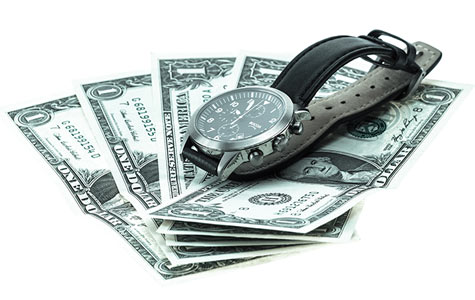
If you have never heard the term transaction costs, then you are probably spending way too much on purchases.
Budgeting of time or money means getting the most bang for the buck (or hour) and being aware of transaction costs will help make better use of time AND money (because time is money).
Concept 1. Your time has value
Do you think of your time as having a monetary value? You do when you take a job. You agree to a certain salary and are saying to your employer that your time (and effort and knowledge) has a value of so many dollars an hour.
Do you ever think of that hourly amount when doing errands or spending time with friends?
A little planning can get you where you need to be, when you want or need to be there. This can save time and aggravation (remember: time=money).
Concept 2. Every purchase or errand has a transaction cost
Transaction cost does not just include your time. It also includes anything it costs you to make that purchase such as gas or parking.
It also includes the energy you use to make the purchase.
Concept 3. Consider Time, Money, and Energy for most purchases
In making a purchase consider the cost of the item, the time and the energy it will take to get it. Ask yourself if there are other errands you can do at the same time, can you wait, is there an easier way to buy it?
Also consider in transaction cost if you tend to buy things you really don’t need at the same time? Sometimes this is the biggest transaction cost.
I don’t like to shop- at all, and find that buying on Amazon is great for me. I have Amazon Prime and purchase a lot there, so the transaction cost (shipping) is minimal. But if purchasing shoes from a new brand, with my sensitive feet it is sometimes easier to shop in a store to get the right fit rather than having to return shoes via post or parcel service.
Concept 4. Don’t forget entertainment or aggravation factors are transaction costs, too
If you like to shop and find it fun to go from store to store to find what you’re looking for (entertainment), or find shopping the worst kind of hell (aggravation), then take that into the equation, too.
Concept 5. Transaction costs can be applied to other areas
Do you have work that needs to be done around your home? IF you make $40/hour and it takes you an hour to mow the lawn plus the cost of lawn material stickers for clippings pick up (and you really hate doing it), you might be better off having a service do it for $25. This only works if you can actually be making $40 instead of mowing or if you have disposable income.
If you don’t enjoy someone’s company (high aggravation factor), do you really want to have dinner with them?
Free time has the most value since, for most of us, there is never enough of it. Consider what will give the highest value to that time, at the least transactional cost.
This rule also applies to activities. If going to dinner and a movie, find out beforehand when the movie is, and plan dinner around it to minimize transaction cost.
Putting it into practice:
Group errands to do together. Do them on the way somewhere.
Consider your options before making the purchase or making plans. Take time, money and energy (and entertainment and/ or aggravation factors) into account. Can you reduce the number of trips to the store by buying 2 of something?
Two Great books on money management
The Savage Truth on Money
The Money Book for the Young, Fabulous & Broke

Leave a Reply